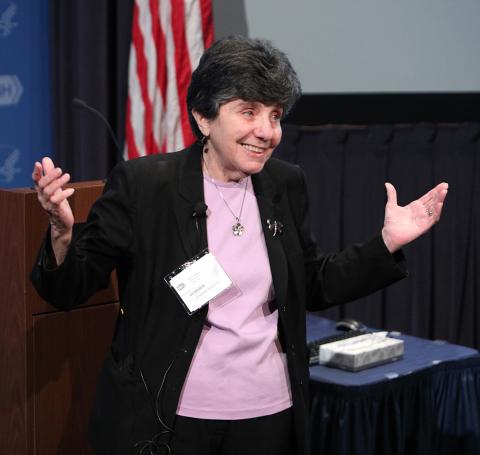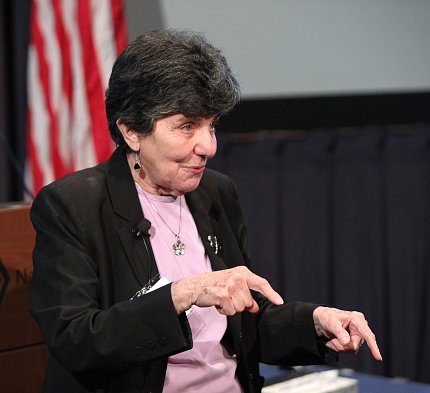You Can Change the World
To Maintain Public Trust, Manage Conflict, Counsels DeAngelis

Photo: Chia-Chi Charlie Chang
Before she could address the need for physicians to negotiate successfully the inevitable challenges of conflict of interest, Dr. Catherine DeAngelis, editor-in-chief emerita of the Journal of the American Medical Association, had to deal with a cultural difficulty.
“I’ve got this laser pointer in my right hand,” she confided at the outset of her Clinical Center 2018 Distinguished Clinical Research Scholar and Educator in Residence Lecture on Feb. 14, “and in my left hand is this thing that advances the slides. But I’m Italian, so how am I supposed to talk?”
DeAngelis, who is also university distinguished (“not extinguished”) service professor emerita of pediatrics at Johns Hopkins University School of Medicine and Public Health, spoke on “Conflict of Interest in Medicine: Facts and Friction.”
Trust lies at the heart of what it means to be a medical professional, she said. It holds the entire patient-caregiver enterprise intact.
“We are all in a position of trust,” she said, “but conflict of interest is ubiquitous and inevitable for all of us. We all have [conflicts] and we need to assure that they don’t result in any harm.”
Financial conflict comes in myriad forms, she explained, from payment (where “appropriateness is key, not something beyond it”) to affiliations, consultancies, competing interests and material/financial interests.
“You can choose to be in the control group or the out-of-control group,” she quipped.
Big pharmaceutical companies have focused more in recent years on marketing than on science, she said. “The pipeline for new drugs is drying up.”
Drug companies are, of course, indispensable, DeAngelis allowed, but many relentlessly scheme for profits rather than produce new drugs.

Photo: Chia-Chi Charlie Chang
She once studied the number of conflict-of-interest articles cited annually in PubMed, from 1974 to 2010. There was virtually nothing until the late 1980s, when the number spiked dramatically.
That was about the time that pharma CEOs were claiming that it cost about $800 million to develop one new drug, a figure that, 2 years ago, ballooned to $3.2 billion. Big money was prompting a shady culture of influence-peddling.
A New York skeptic in the mold of the old TV detective Columbo, DeAngelis wasn’t buying these inflated figures and demanded an explanation. When a CEO tried to insert NIH’s annual budget appropriation into the new-drug cost calculus, DeAngelis called b.s. “Sir, I was born at night, but not last night.”
From her perch as JAMA editor, DeAngelis and her peers at other major medical journals could detect a growing odor of corruption. Drug companies would buy the credibility of otherwise esteemed physicians, at whose talks paid audience members would encourage off-label use of the drug being touted.
“These companies spent hundreds of millions of dollars each year influencing doctors’ decisions,” said DeAngelis. “They wouldn’t do it if it weren’t effective.”
She estimates that between 1 and 2 of every 4 investigators now has an industry affiliation. And studies show that pharma gets what it pays for—if a drug company funds an evaluation, you can bet its product will be “proven” effective. “Anybody who thinks it doesn’t is living in la-la land.”
Other ills catalogued by DeAngelis and her fellow editors include hiding the bad news in clinical trials, fabricating data, hiring guest authors and ghost writers who had nothing to do with the study and deliberate lying, including one paper that reported only 6 months of data when there were actually 12 months of data available.
To address the issue of transparency in reporting trial results, the National Library of Medicine, in the early 2000s, created www.clinicaltrials.gov, an online repository of clinical trials. If you got NIH funding for your study, the law required registration at the site.

Photo: Chia-Chi Charlie Chang
But no one was enforcing the requirement, DeAngelis said, so she and the editors of 11 other major journals made a pact among themselves: if you don’t register your trial, we won’t publish your results.
“The pharmaceutical companies, I think, wanted to kill me,” DeAngelis said. At a meeting hosted by what was then known as the Institute of Medicine, the editors withstood the objections of pharma, which was crying “Restraint of trade!”
Nonsense, countered DeAngelis, there are more than 1,000 journals.
“You’re revealing industry secrets!” Nope, she said, the compounds are deliberately blinded.
At one point in the meeting, an FDA representative became indignant, charging DeAngelis and her colleagues with impeding medical progress and asking why she cared so much.
“I care because you don’t,” countered DeAngelis, “so shoot me.”
DeAngelis explains, “If they’re going to deal with my integrity, they’re going to follow my rules…Here we were, 12 people, with no legal jurisdiction or standing, and we made a difference. Don’t think you can’t make a change.”
Today, sunshine laws require all pharmaceutical and device companies to keep a record of all payments given to physicians and teaching hospitals, a step DeAngelis believes has been effective. “I know dozens of physicians and researchers who changed what they did” as a result, she said. “Policies on disclosure are essential.”
The complete talk is available at https://videocast.nih.gov/summary.asp?Live=27082&bhcp=1.
